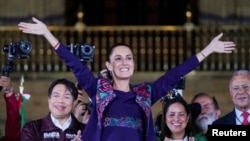Claudia Sheinbaum, a climate scientist and former Mexico City mayor, has won the Mexican presidency, becoming the country’s first female leader in its 200-year history.
Sheinbaum was the favored successor of outgoing President Andres Manuel Lopez Obrador and vowed to continue in the direction set by the populist leftist leader. She said her two opponents, Xochitl Galvez and Jorge Alvarez Maynez, had both called her to concede her victory.
"I promise that I am not going to let you down," Sheinbaum said, greeting supporters in Mexico City's colonial-era main plaza, the Zocalo.
With nearly half the ballots from Sunday’s voting counted, the National Electoral Institute said Sheinbaum had between 58.3% and 60.7% of the vote, while Galvez had 26.6% to 28.6% and Maynez between 9.9% and 10.8%.
Sheinbaum's Morena Party was also projected to hold its majorities in both chambers of Congress.
With preelection polls showing the two leading candidates were women, it left little doubt that Mexico would make history on Sunday.
"I didn't make it alone," Sheinbaum said shortly after her victory was confirmed. "We've all made it, with our heroines who gave us our homeland, with our mothers, our daughters and our granddaughters."
Sheinbaum will also be the first person with a Jewish heritage to lead the overwhelmingly Catholic country, although she is not religiously observant, her campaign has said.
She will start her six-year term on October 1. Mexico's constitution does not allow for reelection, so Lopez Obrador’s presidency will end the day before.
In a statement, President Joe Biden congratulated Sheinbaum. “I look forward to working closely with President-elect Sheinbaum in the spirit of partnership and friendship that reflects the enduring bonds between our two countries,” he said.
Sheinbaum has said she believes the government has a strong role to play in addressing economic inequality and providing a sturdy social safety net, much like her political mentor, Lopez Obrador, had espoused.
Shortly after the electoral authority’s announcement of the ongoing vote count, Lopez Obrador said, "Of course, I congratulate Claudia Sheinbaum with all my respect who ended up the winner by a wide margin."
If her margin holds, it will surpass his landslide victory in 2018. Lopez Obrador and his Morena Party won the presidency after two unsuccessful tries with 53.2% of the vote, in a three-way race where the National Action Party took 22.3% and the Institutional Revolutionary Party took 16.5%.
Sheinbaum pledged to build a just and more prosperous nation that is fiscally responsible, without corruption and without impunity. She said the government would work on energy sovereignty and renewable energy.
Sheinbaum also said Mexico will have friendly relations with the United States.
But she will have to manage sometimes tense relations with the U.S., in particular the vexing issues of cross-border drug smuggling and migration.
Migration across the northern Mexican border into the U.S. is a key issue for many U.S. voters ahead of the November election between Democratic President Joe Biden and Republican former President Donald Trump.
Sheinbaum is unlikely to engender the kind of unquestioning devotion that Lopez Obrador has enjoyed.
In the Zocalo, Sheinbaum's win did not draw the kind of cheering, jubilant crowds that greeted Lopez Obrador's victory in 2018. Her supporters were enthusiastic, but comparatively few in number.
Voters on Sunday also elected governors in nine of the country's 32 states and chose candidates for both houses of Congress, thousands of mayorships and other local posts, in the biggest elections the nation has seen. The campaign was also marked by violence.
The elections were widely seen as a referendum on Lopez Obrador, a populist who has expanded social programs but largely failed to reduce drug cartel violence in Mexico. The Morena Party currently holds 23 of the 32 governorships and a simple majority of seats in both houses of Congress.
In a nation where politics, crime and corruption are closely entangled, ultra-violent drug cartels went to extreme lengths to ensure that their preferred candidates won.
Hours before polls opened on Sunday, a local candidate was murdered in a violent western state, authorities said, one of at least 25 other political hopefuls killed during the campaign, according to official figures.
The victims "are not here on this day, and that's very sad," Galvez told reporters while going to vote.
Galvez vowed a tougher approach to cartel-related violence, declaring "hugs for criminals are over."
More than 450,000 people have been murdered, and tens of thousands have gone missing since the government deployed the army to fight drug trafficking in 2006.
Some information for this story came from The Associated Press, Agence France-Presse and Reuters.





